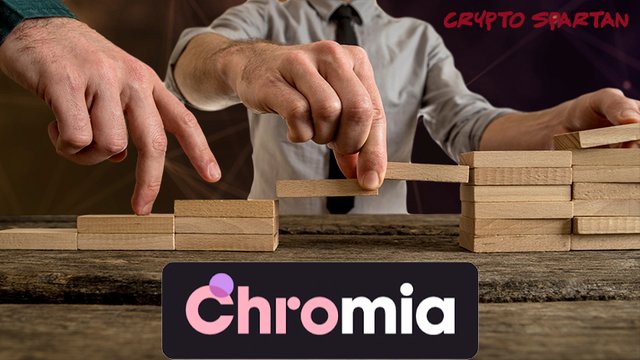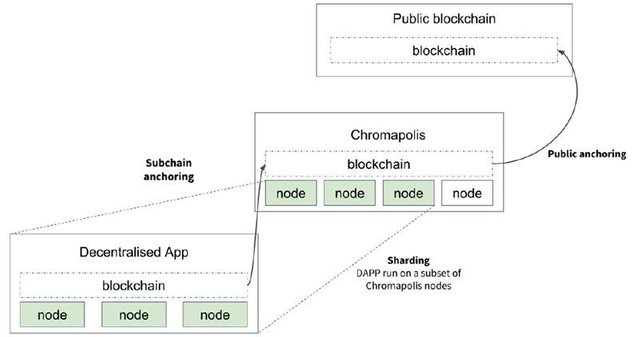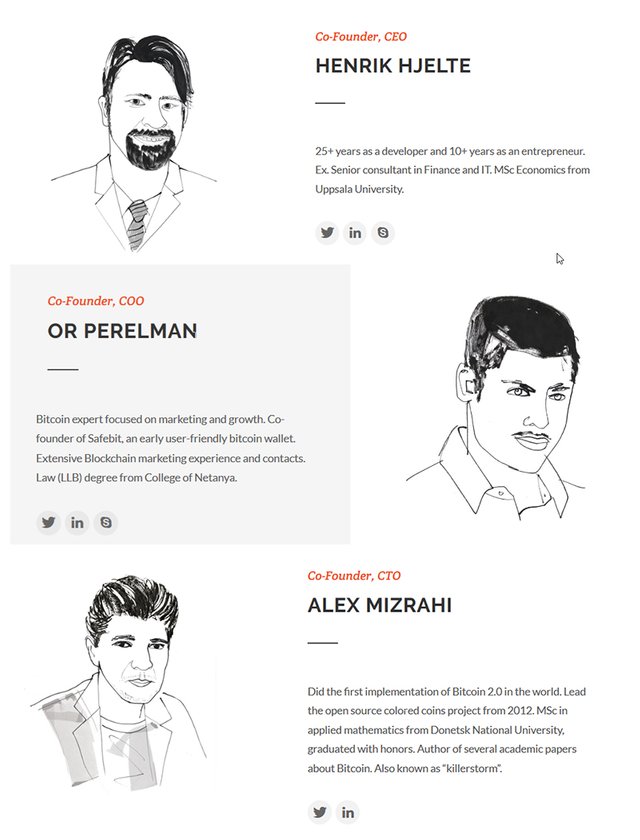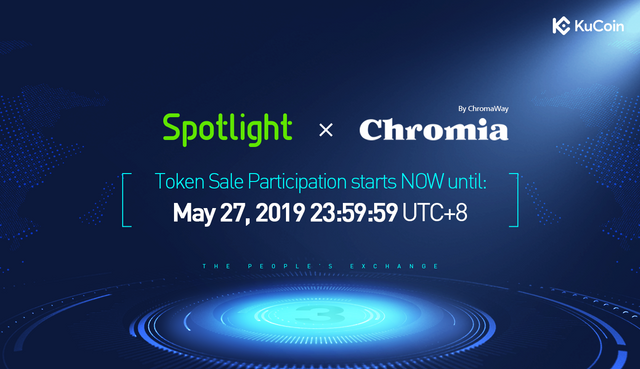Chromia: Facilitating the Evolution of Decentralized Applications

Overview & Vision
Aside from the means to enable a truly sound system of currency, blockchain has another ‘killer application’: DApps themselves. Blockchain is enabling the development of applications which do not rely on a centralized party for operation, meaning they can be more resilient, autonomous, and secure than their traditional counterparts. Immune to single points of failure and censorship resistant, users of decentralized applications themselves benefit from increased control and autonomy. The use of blockchain-based architecture means DApp users can be verifiably sure of the control of their own data and digital presence.
Decentralized applications undoubtedly harness the potential to revolutionize much of our digital experience, firmly placing the power into the hands of the users… but not as they stand today.
Despite the existence of upwards of 10 blockchain platforms in the top 50 projects by market cap alone, DApps remain a niche subsection of overall application development and usage. According to DApp Radar almost half of the most popular decentralized apps are gambling-related, with the top 5 DApps reportedly garnering just over 30K users in a 24h period; for context, Facebook claims over 1.5 billion daily active users, and MySpace (the social network everybody forgot about 8 years ago) still receives over 200K visits per day alone. We still have a very long way to go to mainstream adoption.
Why so little interest in DApps at a practical level? Because DApps in their current form are unintuitive and uninteresting , severely limited by the constraints of their chosen blockchain’s architecture and the barrier to entry of a complex programming language.
Although the blockchain space is still in its fledgling phase, it’s important to note that we are already encountering hurdles on the DApp development front which present huge fundamental problems if we are to ever take DApps mainstream. Chromia looks to overcome these hurdles through combining relational databases with blockchain, providing several notable advantages to current platforms and opening the door to new possibilities in the field of DApp development.
In order to achieve mainstream adoption of DApps, Chromia believe current blockchain architecture and programming models need to be seriously reimagined. Inspired by the shortcomings of existing platforms, Chromia is a designed with the requirements of developers and users explicitly in mind, built to facilitate the creation of genuinely scalable, secure and feature-rich decentralized applications.
What if DApps could be written in a language and with a programming model already familiar to developers? What if a single DApp could scale to millions of users by utilising its own blockchain? What if DApps could be empowered with the autonomy to decide their own resource allocation, governance rules and economic model?
Chromia is looking to provide the answers.
Current Industry Situation: In Need of Innovation
There are two key aspects which severely limit DApp development and usage in the current blockchain environment: poor developer experience and limited performance capacity.
From a developer’s perspective, the current complex blockchain programming languages are unfamiliar and difficult to learn. Ethereum provides a much higher level programming language than that of Bitcoin, but their programming model is inherently riddled with security risks (leading to instances such as the infamous DAO hack). This presents a huge barrier to entry on the developer level.
Established networks are consistently congested and the transaction processes are too lengthy to be realistically usable for high-user-volume DApps. When CryptoKitties overloaded the Ethereum blockchain in December of 2017, the problem was caused primarily by the activity of the 14,000 daily users of the cat-based DApp which it had at its peak… just 14,000! The congestion didn’t just affect users of the DApp; the event impacted the whole Ethereum ecosystem. Even as of now, there is no solution which enables Ethereum to act as a reliably fast and scalable smart contract system.

The cute blockchain-hosted cats caused huge problems for the Ethereum network and exposed the scalability limitations of conventional blockchian platforms
Existing blockchain protocols are simply not up to the task of facilitating the creation or maintenance of large-scale dapps designed for mainstream use; the required infrastructure and tools are not present. What’s required is clearly nothing less than a total reimagining of current blockchain architecture and programming models.
Chromia’s Solution: An Evolution in DApp Development
Essentially, Chromia’s goal is to build a platform which offers superior performance for decentralized applications, whilst providing the tools to make development as easy as possible for developers of all backgrounds. This is not an easy task; to effectively tackle some of the industry’s toughest problems, a systematic multi-pronged approach is required.
Familiar Programming Model
Chromia aims to empower developers by enabling them to build decentralised applications without prior blockchain experience, which is reflected in the platform’s programming model. Below the surface, Chromia acts in the same way as a relational database- the same model as with traditional enterprise applications. This makes for simple and efficient data store and query capabilities. Rell, Chromia’s native programming language, is explicitly designed to be easy to learn for programmers whilst being type-safe, safety-optimised, concise, expressive and convenient; no other existing language has this feature set.
Employing a relational model and programming language removes the unnecessary complexity of blockchain and transforms the process of development into something much more familiar for general programmers. This means easy onboarding of developers and huge incentives over existing blockchain platforms for them to do so- programming on Chromia is designed to be a familiar experience for the wider developer community, inherently breaking down multiple barriers to entry.
Performance & Scalability
Chromia is designed to be highly scalable from its very inception. At the core, the platform utilizes Practical Byzantine Fault Tolerance (PBFT), which means it can handle a large number of transactions- up to 1000 transactions per second per blockchain. Yes, I said per blockchain. That’s because each application in the Chromia ecosystem will run on its own independent blockchain (or multiple blockchains acting as sidechains if greater performance is required), enabling a high I/O rate and easy horizontal DApp scalability. Through Chromia’s approach, individual DApps will be able to easily scale to millions of users.

Outline of Chromia's network architecture
Individual applications will bear their own costs and will be responsible for the implementation of their own resource management. This allows for a new level of DApp-level flexibility and autonomy. Because each is running on its own blockchain, any mismanagement or overloading of the network of one DApp will remain problematic for that specific chain only, and will not interfere with the wider Chromia ecosystem.
Secure Consensus Mechanism
There is much argument in the blockchain space as to the most effective consensus mechanism- is it Proof of Work (PoW), Proof of Stake (PoS), or something else entirely? Each has its strengths and drawbacks, igniting heated debate regarding the trade-off between security and decentralization. Chromia believe the answer lies in a mixture of existing approaches, and are therefore adopting a hybrid consensus mechanism primarily based on the PBFT model. As a Byzantine fault tolerant network, Chromia will be resistant to arbitrary and potentially malicious behaviour, enabled to correctly reach a sufficient consensus despite malicious actors (nodes) in the system failing or propagating incorrect information to other peers.
Chromia’s PBFT mechanism is further secured by anchoring Chromia chains to a PoW blockchain, such as Bitcoin. In this way, the finality of confirmed transactions can be as much guaranteed as that of the anchoring blockchain (i.e. transaction integrity will be as secure as that of Bitcoin transactions, if anchored to the Bitcoin blockchain).
Gaming Use Case: Power to the Players
As a general-purpose platform, Chromia is suitable for almost all types of dapps, but is particularly well suited to use cases requiring high I/O capacity or involving management of complex data sets. Massively multiplayer online games (MMOGs) are such an example, which also present an excellent way to demonstrate the performance capabilities of the platform; entire worlds can be built on top of Chromia’s decentralized infrastructure. It’s for this reason that gaming is one of the primary initial focus points for the team. Chromia want to prove the enormous scalability potential of their platform through practical demonstration- let the tech speak for itself.
Each DApp in the Chromia ecosystem is entirely free to set its own governance rules and procedures, enabling unparalleled DApp-level autonomy and presenting a plethora of possibilities in the way of economic models and community governance structures. Taking gaming as an example, players could form a sort of ‘mini democracy’, whereby changes to game logic such as patches or updates can only be implemented if agreed upon by the majority. Further, because the system is hosted on Chromia’s decentralized infrastructure, in the event of a game company deciding to discontinue development of their Chromia dapp, for example, the community would be free to cover the upkeep costs of the network and take the reins; in this scenario, if the public demand is there, the community have the power to implement their own will.
Essentially, Chromia is providing the infrastructure, mechanisms and tools to completely revolutionize the gaming experience– to mention just one of their limitless use cases.
Team Overview: The Innovators Behind Chromia
As I always say, anybody can write an impressive whitepaper and create a persuasive website; the idea is the easy part, it’s the implementation of the idea which is difficult. In the Wild West of crypto, ensuring that the team has the experience and capability required is crucial- especially when evaluating a project as tech-heavy and fundamentally grand as this.
In the case of Chromia, the team is a truly impressive collaboration of industry veterans. Chromia CEO Henrik Hjelte is a serial entrepreneur and accomplished developer with 30+ years of experience, whom is well versed in economics and business. COO Or Perelman has been a blockchain entrepreneur since 2011, perhaps most notably previously co-founding Safebit, ‘the world’s first user-friendly Bitcoin wallet’ alongside Ripple's former Chief Technology Officer Stefan Thomas. Alex Mizrahi, Chromia CTO, took the lead role in the Colored Coins project from 2012- the blockchain industry’s first foray into digital assets, at that time based on the Bitcoin blockchain.

Chromia co-founders, as seen on the ChromaWay (parent company) website: https://chromaway.com/aboutus/
Aside from the co-founders, the Chromia core team consists of a healthy mixture of highly accomplished developers, marketers and business development specialists.
Very few blockchain projects can boast such an experienced team of industry veterans with such impressive credentials and pioneering accomplishments within the space.
Token Sale Details
After the successful completion of their private sale last year, which saw fundraising of approximately $11m, Chromia are launching their crowdsale on Kucoin as the next project in the Kucoin Spotlight.
Details of the crowdsale are as follows:
Token Name: Chromia (CHR)
Token Type: ERC-20
Token Sale Date: 28/5/2019 (UTC+8)
Spotlight Hard Cap: 2,000,000 USD
Spotlight Allocation: 40,000,000 CHR
Spotlight Token Sale Price: 1 CHR = 0.05 USD
More details can be found in the official Kucoin announcement: https://www.kucoin.com/news/en-announcement-of-chromia-chr-token-sale-on-kucoin-spotlight
Although registration to participate in the IEO closes at May 27, 2019, 23:59:59 (UTC+8), trading of CHR on Kucoin will commence shortly afterwards, at 22:00:00 on May 28th, 2019 (UTC+8). Exchanges other than Kucoin are expected to follow shortly afterwards.
Summary: Power to the People
Chromia is aiming to combat the pitfalls of established blockchain platforms through combining relational databases with blockchain, providing several notable advantages to current platform and opening the door to new possibilities in the field of DApp development. By adopting a relational blockchain model and programming language, developing on Chromia is designed to be a familiar experience for the wider developer community- breaking down multiple barriers to entry in the process.
Each application in the Chromia ecosystem will run on its own independent blockchain, enabling an unprecedented level of dapp-level scalability, flexibility and autonomy. This can be achieved with minimal security concerns thanks to the platform’s use of native safety-focused programming language and innovative hybrid consensus mechanism.
Chromia’s novel approach to decentralized application development is systematically designed to overcome the hurdles of the current dapp development space, and may hold the answer to mainstream-level DApp development. I for one will be following Chromia’s exciting journey with a keen eye.
Note: this is NOT a sponsored review. I believe in the team's vision and want more people to be aware of Chromia's mission.
Have any questions regarding Chromia? Join their active community on Telegram where you can discuss anything Chromia-related: https://t.me/chromapolisbychromaway
Learn more at their website: https://chromia.com/
Dig in deeper with Chromia 's whitepaper: https://chromia.com/documents/Chromia-_-Platform-white-paper2019.pdf
Get connected to Chromia on social media:
Twitter: https://twitter.com/teamchromia
Facebook: https://www.facebook.com/teamchromia
Disclaimer: this is not financial advice in any form, it is my opinion and insight based on research and you should always do your own research before committing to anything financially whatsoever.

preach! easy reliable dapp dev is key at this point. multi billion dollar platforms and they can't even scale properly. we are still early but still, I don't think we can bet on the approaches we've got now in the long run. we will see!
hopefully they can get the developers though, thats a whole other priority. no devs= no dapps
Absolutely @anupamsingh! My thoughts exactly. We've still got a long way to go to reach mainstream adoption levels, but the core infrastructure and tools available for DApp development are key. Otherwise, the vast majority of developers can't access the space easily and any DApps that are built are severely limited in performance capacity and scaling. On the developer front, Chromia is always engaged in attracting deelopers to the platform- they have specific outreach methods, their own dev group, and a developer bounty program coming up with the testnet launch to name a couple of things.
Cool, thanks spartan. Might see what this baby does when hits exchange
To listen to the audio version of this article click on the play image.

Brought to you by @tts. If you find it useful please consider upvoting this reply.
Too late for IEO? When is test net planned for?
ieo is tomorrow, don't know about test net
The IEO is scheduled for 28th May, though at this point I don't think there's time for KYC verification which is required. You can check the details in the official Kucoin announcement: https://www.kucoin.com/news/en-announcement-of-chromia-chr-token-sale-on-kucoin-spotlight
Testnet is launching as we speak, and mainnet is due for end of July!
how does the new language help when block chain devs will just have to learn another all over again
The point of Rell is its familiarity, meaning it's worlds easier for developers to learn Rell than it is to learn Solidity for example. Any developer who knows a blockchain programming language will find Rell a breeze to learn, as will programmers of general backgrounds!
Nice to see new project like yours coming soon!
I wanted to invite you to list your ICO on InitialCoinList.com.
Our platform is 100% free and it will only take you a couple minutes.
If you are interested, pleased go to https://www.initialcoinlist.com/free-ico-sto-listing
Hope to see you there soon, have a good day and a great ICO!
Jean-Simon - InitialCoinList.com
Visit my Steemit
My website: ICO List - ICO Filters - ICO Custom Alerts
Look into coti ieo happening kucoin also in June
Color scheme is a bit fruity but tech and team looks very solid. Thanks!
This post has received a 6.12 % upvote from @boomerang.
now that it looks like the bulls are back in town you should think about looking into a news segment on your channel, would be great to see! think we're going to see a lot more people enter the space with this positive sentiment